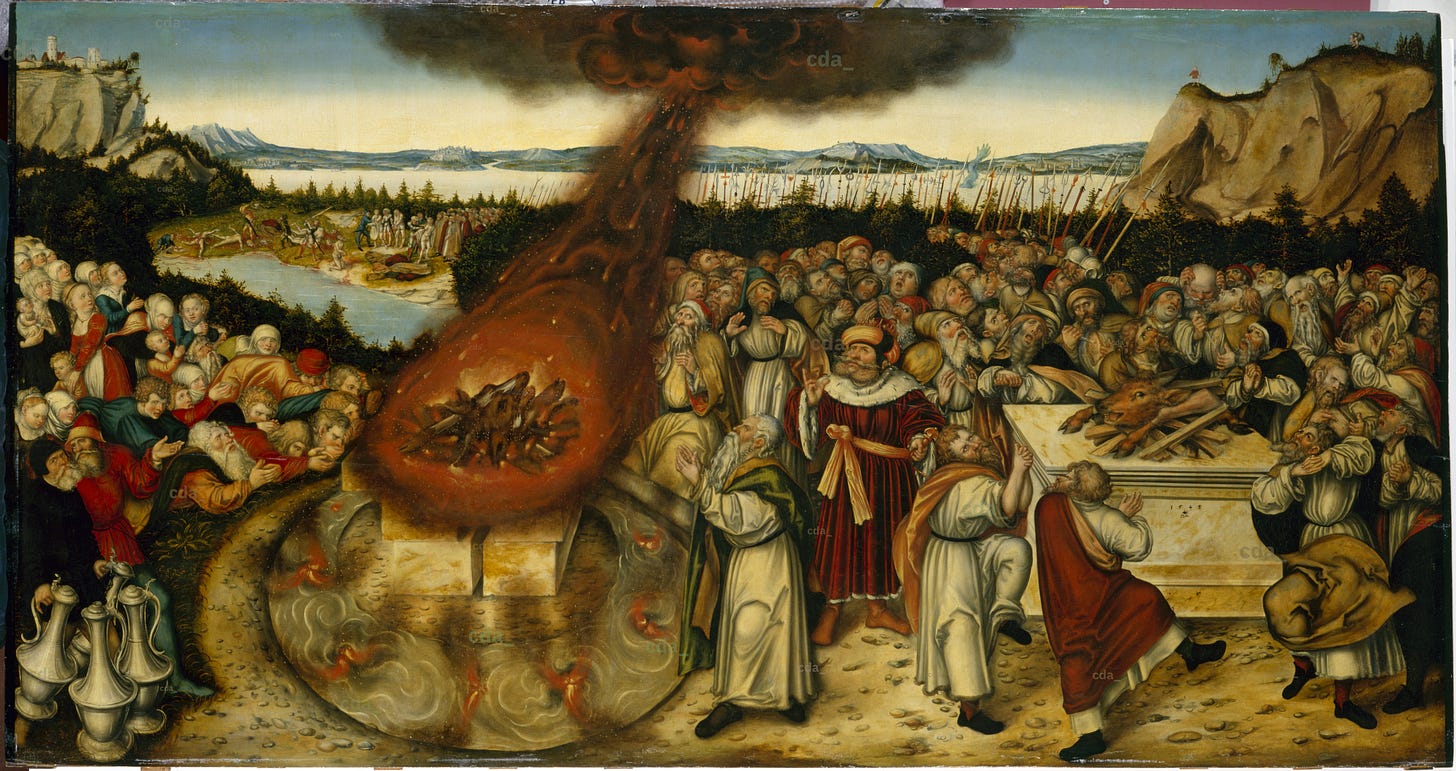This week I was teaching the fifth grade students in the school about the prophet Elijah, and we read the famous story in the First Book of Kings of Elijah’s epic showdown with the prophets of Baal. You might remember how it goes. On Mount Carmel, Elijah challenges the prophets of Baal to call upon their god to send down fire upon the sacrifice that had been prepared. When nothing happens, Elijah begins to taunt them, quite comically. When at last they’ve given up, Elijah calls upon the God of Israel, and the fire of the Lord falls from heaven and consumes his sacrifice in the sight of the people.
Now, if I had been teaching a younger grade, I probably would have stopped there. It’s a good, somewhat amusing story with a clear message. But I’ve found that fifth graders are generally able to handle the Bible’s messier bits, so I let them read on: And Elijah said to the people: Seize the prophets of Baal; let none of them escape. And they seized them; and Elijah took them down to the brook Kishon, and killed them there.
To be honest, I didn’t have anything prepared to say about the fact that Elijah, God’s prophet, after proving his point singlehandedly killed all 450 prophets of Baal. But one girl, sitting in the front, made me. She raised her and asked: Did God really want that? By the look on her face, I knew she wasn’t going to let me off the hook! So, I pieced together an answer, which, as it happened, drew upon the Gospel we’ve heard today. Here’s an elaboration of what I told her.
Elijah lived about 900 years before Christ and in a religious and cultural context far from our own. I’m no expert, but in the ancient world prophets killing prophets probably wasn’t an uncommon occurrence. Crusades in the Holy Land during the Middle Ages, post-Reformation religious wars in Europe, and present-day martyrdom in Nigeria are all painful reminders that the tendency of people’s convictions to boil over into violence is not limited to any time or place.
But the question remains: Does God want any of that? We could say a lot about how to read difficult texts like this—for example, what role the human author plays in relation to the Holy Spirit who inspires them—but the easy, straightforward answer to this fifth grader’s question, which we’ve certainly all asked for ourselves is, simply: No. Because the same God in whom Elijah believed speaks to us today: I say to you, love your enemies, and pray for those who persecute you. That is what God wants: love, not violence.
Throughout history, including the history of the Old Testament, God reveals to his people, gradually, the form of life in which they are to be perfect as he is perfect – that is to say, he leads them to become one with Christ in being and in act. This revelation is a process that takes millennia to play out, and it still needs its final realization in our day. But the path to perfection has been laid. Christ has taught us from the mountain how we are to live, what perfect human life looks like, and we are to live entirely and only as people of love.
Love, as Hans Urs von Balthasar titled one of his books, is the only quality of life that makes Christianity credible. When we think of how we want someone to convert, we think too often of how we need to convince them of this bit of doctrine or that bit of morality. Sometimes those are necessary components. But if they’re not accompanied by and covered with love, our attempts to evangelize will be worthless, ineffective, and they will even probably do more harm than good.
This week, the Church begins again the great campaign of Christian service that is the season of Lent. What each of Lent’s three pillars—prayer, fasting, and almsgiving—are meant to do is to strip away from us that which inhibits, diminishes, or contradicts our love. Our attachment to worldly concerns, to pleasures of the flesh, and to material wealth weaken our attachment to God. We cannot love two masters. We cannot be people of two hearts. Let all that you do this Lent be directed toward love: for that is what God wants, what Christ commands us to do, and what the Holy Spirit enables us to attain.
Homily preached February 18/19, 2023 at the Cathedral of Mary Our Queen




